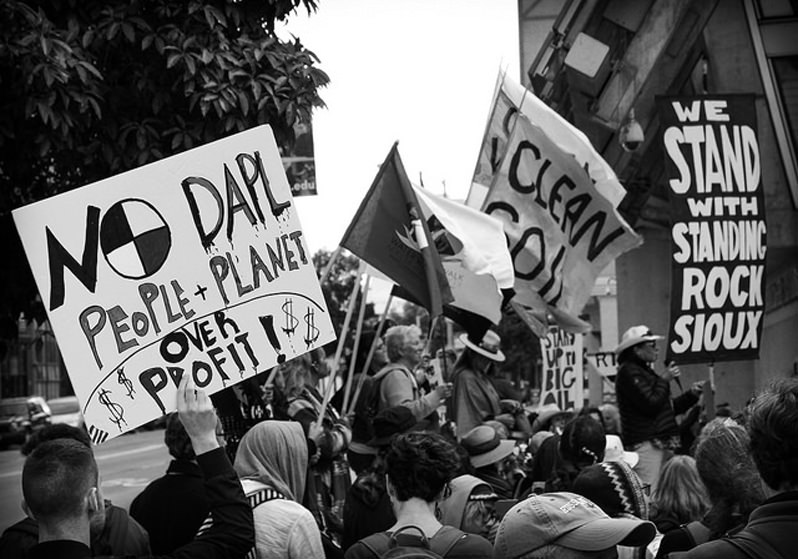‘We’re Not at War’: Indigenous Protesters Call on Feds to Intervene Against Military-Style Crackdown
Water protectors have endured dog attacks, checkpoints and invasive strip searches at the Dakota Access pipeline construction site. Peg Hunter / CC BY-NC 2.0
Peg Hunter / CC BY-NC 2.0
By Sarah Lazare / AlterNet
Military-style checkpoints. Low-flying surveillance planes. Invasive strip searches. These are just some of the repression tactics that have targeted the thousands of Indigenous people and supporters who, heeding the call of the Standing Rock Sioux Tribe, mobilized to North Dakota to stop the proposed $3.8 billion crude-oil Dakota Access Pipeline (DAPL).
Now, those people—who call themselves water protectors—are demanding that the Department of Justice intervene to halt the state violence. “I am seeking a Justice Department investigation because I am concerned about the safety of the people,” Standing Rock Sioux Tribal Chairman Dave Archambault, II said in a statement released on Tuesday. “Too often these kinds of investigations take place only after some use of excessive force by the police creates a tragedy.”
In a letter to Attorney General Loretta Lynch, The Standing Rock Sioux Tribe outlined a litany of abuses:
We have seen police set up roadblocks and checkpoints on the public roads, making unwarranted stops to ask drivers where there are staying, why they are on the road and where they are going. These stops are clearly targeted at Indian people, and are designed to intimidate free speech.
We have seen constant surveillance, with low flying planes and helicopters constantly overhead at the camps of the water protectors. These camps are an historic gathering representing hundreds of Tribes that have come together in unity and prayer, and the surveillance violates the participants’ right to privacy and right to assemble and pray together.
We have seen local law enforcement use strong-arm tactics to make arrests of peaceful protestors as they prayed, and use invasive and unlawful strip searches of men and women who have been arrested for misdemeanors.
The letter blasts the “overall militarization of law enforcement response,” noting that “The Governor called out the National Guard in September, and military vehicles are being used at roadblocks and checkpoints.”
“To many people, the military tactics being used in North Dakota are reminiscent of the tactics used against protesters during the civil rights movement some 50 years ago,” the letter states. “But to us, there is an additional collective memory that comes to mind. This country has a long and sad history of using military force against indigenous people—including the Sioux Nation.”
On Saturday, 127 protectors were arrested at a march by police in riot gear, some of whom carried assault rifles, and multiple reports of violence have emerged, including forced strip searches. “What happened on Saturday was completely uncalled for, out of—out of the realm of any understanding of people who exist in this world who are trying to do something good and right,” Sacheen Seitcham, an organizer with the West Coast Women Warriors Media Cooperative, told Democracy Now.
In early September, private security forces employed by Dakota Access LLC assaulted protesters with attack dogs and pepper spray, provoking widespread condemnation.
Amid this harsh treatment, the protectors are escalating their mobilization. “If you can, come out and stand with us,” said the organization Honor the Earth, in a statement released Sunday. “If you cannot, call the Army Corps of Engineers HQ in DC. Write them a letter. Call the White House.”
According to the Standing Rock Sioux Tribe, “More than 300 tribes, millions of supporters, 21 city governments, 19 members of Congress and several members of the U.S. Senate have enlisted their support to protect water and sacred places.” If approved, DAPL pipeline—which is backed by Enbridge—would transport at least 470,000 barrels of crude oil daily from North Dakota’s Bakken fields to Illinois, crossing beneath the Standing Rock Sioux reservation’s main drinking water source and cutting through the community’s burial grounds.
“Nobody is telling the real story of what’s coming out of these camps, why we’re doing this,” Cody Hall, media spokesperson for the Red Warrior Camp,” told AlterNet. Hall traveled from his home at the Cheyanne River Indian Reservation in South Dakota to take part in the protests.
“Our overall goal is that this pipeline is not built,” he said. “Our overall goal is to protect people, protect the human race. This has everything to do with protecting land and water for everybody. We’re protecting future generations. If you live downstream from us, we’re protecting your kids, your grandkids. This is a violation of our civil rights. We’re not at war.”
Your support matters…Independent journalism is under threat and overshadowed by heavily funded mainstream media.
You can help level the playing field. Become a member.
Your tax-deductible contribution keeps us digging beneath the headlines to give you thought-provoking, investigative reporting and analysis that unearths what's really happening- without compromise.
Give today to support our courageous, independent journalists.






You need to be a supporter to comment.
There are currently no responses to this article.
Be the first to respond.